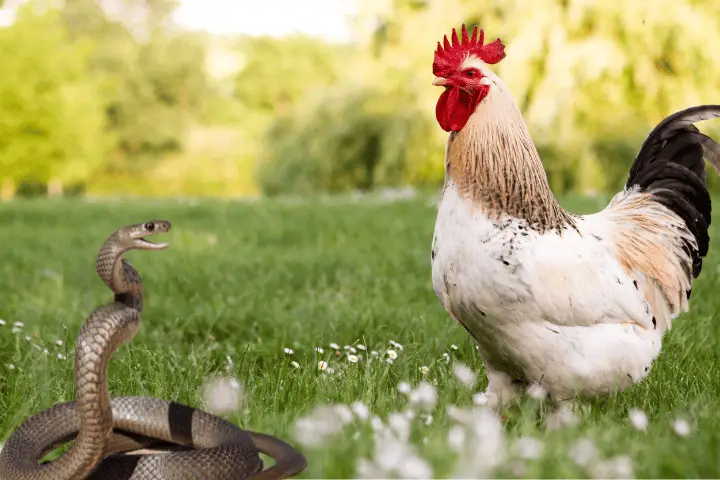Do Chickens Eat Snakes
Can chickens really eat snakes? It may seem unlikely, but let’s explore this curious relationship between chickens and snakes.
Chickens are known for being omnivores and eating a variety of foods, including grains, seeds, insects, and rodents. But, when it comes to snakes, they might surprise you.
Chickens don’t usually seek out snakes as their meal – but there have been cases of them attacking and eating them.
It’s important to note that not all chickens do this. Free-range breeds or backyard chickens with easy access to a wider hunting ground may be more likely to go after snakes.
Smaller snake species like garter snakes are the ones most likely to be hunted by chickens.
The chance of chicken-snake encounters is rare, as snakes usually avoid places with humans or domestic animals. Also, larger snake species may pose a threat to the chickens instead of being eaten.
But, it’s still interesting to see how instinctive behaviors happen in uncommon situations.
Understanding Chickens’ Diet
Chickens have a varied diet. Here’s what you should know:
- Grains: Chickens love grains and these make up a large part of their diet.
- Insects: Chickens are natural bug hunters and enjoy feasting on worms, beetles, and grasshoppers.
- Veggies: Chickens like lettuce, spinach, and carrots for added variety and nutrients.
- Fruits: Chickens have a sweet tooth and like watermelon, berries, and apples as treats.
- Protein: Chickens consume animal-based products like meat scraps or mealworms for protein.
Clean water should always be available for chickens to stay hydrated. A balanced diet with various foods is important to ensure chickens get all the necessary nutrients for good health.
Do Chickens Eat Snakes?
To better understand the question “Do Chickens Eat Snakes?”, let’s dive into the section exploring the natural diet of chickens and the role of snakes in a chicken’s diet.
These sub-sections will provide you with insights into the eating habits of chickens and shed light on whether snakes are part of their regular diet.
The Natural Diet of Chickens
Chickens are omnivores, which means they eat a range of things. From beetles and earthworms to corn and carrots, chickens consume many types of food.
Their diet is full of protein-rich edibles, like insects and worms. Plus, they enjoy grains and vegetables. This assortment ensures they get all the nutrients they need.
Chickens are opportunistic eaters. They search for food, taking any snacks they find – even small reptiles or rodents.
The Role of Snakes in a Chicken’s Diet
Chickens have an intriguing relationship with snakes – while primarily herbivores, they have been known to consume small snakes on occasion. Let’s unearth the details and explore this dynamic further.
Snakes are an occasional prey for chickens. To uncover more, let’s look at some unique facts about this unexpected dietary choice. Chickens rely on their natural instinct to forage and explore.
They may be enticed by the movement or curiosity of small snakes. However, these instances are rare and not a significant part of their regular diet.
Chicken owners should remain vigilant. Secure poultry enclosures to prevent interactions with potentially harmful reptiles.
By taking proactive measures, you can ensure your chickens are safe and still allow for their occasional snake-consumption!
Potential Benefits of Chickens Eating Snakes
Chickens are known to have an appetite for snakes. There are many potential benefits of this behavior. These include:
- Pest control
- Snake population management
- Decreased risk of snake bites for humans
- Improved soil quality
- Natural fertilizer production
Furthermore, certain chicken breeds have been bred or trained to target snakes more effectively. For example, the Aseel breed from Asia is reputed to be a skilled snake hunter.
One example of this is Tenzin, a small-scale farmer from Tibet’s Tsamba region. He noticed more snakes around his farm due to nearby rice fields drying up.
To protect his family and livestock, Tenzin introduced some Aseel chickens. They efficiently hunted and ate the snakes, controlling the population and ensuring the safety of his farm.
So, be vigilant. Or, in other words, keep your chickens away from snake sashimi!
Risks and Precautions
To navigate the risks and precautions of keeping chickens, discover the potential dangers for your feathered friends and learn effective ways to cope with snake encounters in chicken coops.
Potential Dangers for Chickens
Chickens are vulnerable to potential dangers. Keeping them safe is essential. Here are 3 things to consider:
- Predators: Foxes, raccoons, and hawks may harm or even kill chickens. Building a strong fence with locks will prevent access from predators.
- Diseases: Avian influenza and Newcastle disease can spread quickly among a flock. Vaccinations and cleanliness will help reduce the risk of transmission.
- Extreme Weather Conditions: Heat or cold can be fatal to chickens. They need a sheltered space with insulation and ventilation. Moreover, overcrowding increases the likelihood of health issues. Creating enough space per bird is necessary for their well-being.
To protect chickens, here are some precautions:
- Secure Enclosure: Mesh wire below ground level can stop predators from digging in.
- Biosecurity Measures: Regular disinfection and restricted access will lower the risk of disease outbreaks.
- Adequate Ventilation: Proper ventilation ensures optimal temperature for chickens.
These preventive measures reduce risks for chickens. Secure enclosures keep predators away. Good biosecurity lowers the chances of diseases. And proper ventilation keeps chickens safe from extreme temperatures.
By understanding the threats and taking appropriate actions, chicken owners can create a safe and healthy environment for their flocks. This contributes to healthier and happier chickens.
Beware of snakes in chicken coops – they may make better roommates, but their eggs won’t!
Coping with Snake Encounters in Chicken Coops
Coping with snakes in chicken coops can be tricky. But, there are ways to protect your chickens. Here are some steps you can take:
- Inspect the coop for any openings. Seal them off with hardware cloth or small-mesh wire.
- Keep the area clean and tidy. Remove anything that could provide hiding spots.
- Put up a predator-proof fence around the coop.
- Use motion-activated lights or sound devices.
Remember, some snake species are helpful because they eat rodents. But, venomous snakes are dangerous.
When you see one, stay calm. Don’t approach or provoke it.
To minimize the risk of snake encounters, learn about local snake species.
Use natural deterrents like garlic and cinnamon. Also, control pests on your property.
Finally, if you spot a snake near the coop, contact a professional wildlife removal service.
By implementing these suggestions, you can create an environment that minimizes the risk of snake encounters in your chicken coop.
Prevention is key to keeping your chickens safe.
Conclusion
Chickens are famous for their varied diet. However, they don’t usually go after snakes.
They prefer eating insects, grains, and small plants.
Their inquisitive nature often leads them to peck at things around them. But when it comes to snakes, chickens stay away.
Snakes are seen as predators and potential threats. So, chickens stay away from them.
Also, snakes have sharp fangs and venomous capabilities that can be dangerous to chickens. So, it is natural for chickens to avoid potential harm.
Eating a snake is not worth the risk. Plus, snakes have an external covering called scales.
These are hard to digest, so chickens’ digestive system is not built to eat snakes.
It is possible for a chicken to consume a snake under certain circumstances.
But, this is not the norm. Chickens have adapted to a diet of insects and small plants, making them unlikely to eat snakes.

